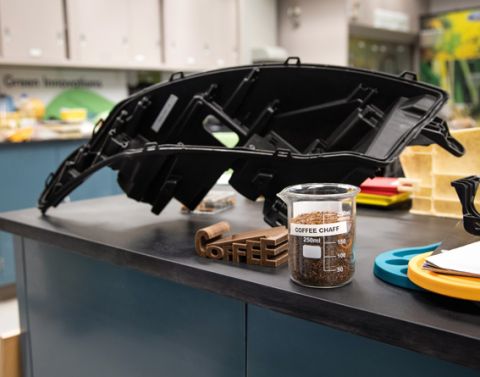Each year, millions of kilogrammes of coffee chaff – the dried skin of the bean, which naturally comes off during the roasting process – are produced. Now, US companies Ford of Dearborn, Michigan, and McDonald’s of Chicago, Illinois, have found that coffee chaff can be converted into a durable filler for plastics. The chaff is first heated in a low-oxygen environment and then mixed with plastic and additives to create pellets, which can be moulded into various shapes.
Ford says that the chaff-filled plastics can be used to produce parts such as headlamp housings, and interior and under-bonnet (hood) components. The resulting parts are approximately 20% lighter than those made from conventional filled plastics and the energy consumed during their moulding is reduced by up to 25%. Further, the chaff-filled plastic is more resistant to high temperatures than incumbent materials.
The other partners on the project were Varroc Lighting Systems of Plymouth, Michigan, USA, which supplies the headlamps, and Competitive Green Technologies of Leamington, Ontario, Canada, the processor of the coffee chaff.
McDonald’s is expected to direct a significant portion of the coffee chaff it generates in North America to Ford for incorporation into vehicle parts. According to a Senior Technical Leader of Materials Sustainability at Ford, Debbie Mielewski, the project is an example of how a closed-loop economy, “where different industries work together and exchange materials that otherwise would be side or waste products”, can be established.
Ford is developing a growing range of biomaterials. Recently, it started working with Jose Cuervo to explore the use of the tequila producer’s agave plant by-product to develop sustainable bioplastics for use in its vehicles(1).
The use of natural materials in the production of future vehicles will be a topic of discussion at the first edition of Textile Opportunities in a Changing Automotive Industry, which will take place in Birmingham, UK, on 5–6 February 2020.

